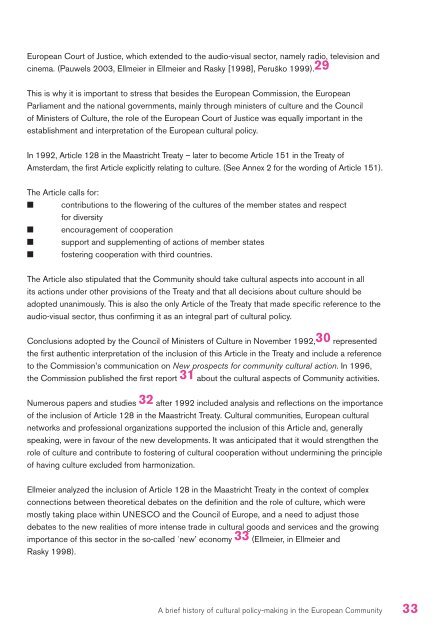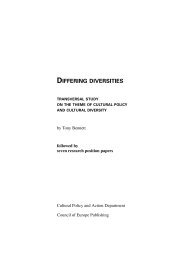Why we need European cultural policies: the impact of EU ...
Why we need European cultural policies: the impact of EU ...
Why we need European cultural policies: the impact of EU ...
Create successful ePaper yourself
Turn your PDF publications into a flip-book with our unique Google optimized e-Paper software.
<strong>European</strong> Court <strong>of</strong> Justice, which extended to <strong>the</strong> audio-visual sector, namely radio, television andcinema. (Pau<strong>we</strong>ls 2003, Ellmeier in Ellmeier and Rasky [1998], Perus˘ko 1999).29This is why it is important to stress that besides <strong>the</strong> <strong>European</strong> Commission, <strong>the</strong> <strong>European</strong>Parliament and <strong>the</strong> national governments, mainly through ministers <strong>of</strong> culture and <strong>the</strong> Council<strong>of</strong> Ministers <strong>of</strong> Culture, <strong>the</strong> role <strong>of</strong> <strong>the</strong> <strong>European</strong> Court <strong>of</strong> Justice was equally important in <strong>the</strong>establishment and interpretation <strong>of</strong> <strong>the</strong> <strong>European</strong> <strong>cultural</strong> policy.In 1992, Article 128 in <strong>the</strong> Maastricht Treaty – later to become Article 151 in <strong>the</strong> Treaty <strong>of</strong>Amsterdam, <strong>the</strong> first Article explicitly relating to culture. (See Annex 2 for <strong>the</strong> wording <strong>of</strong> Article 151).The Article calls for:■ contributions to <strong>the</strong> flo<strong>we</strong>ring <strong>of</strong> <strong>the</strong> cultures <strong>of</strong> <strong>the</strong> member states and respectfor diversity■ encouragement <strong>of</strong> cooperation■ support and supplementing <strong>of</strong> actions <strong>of</strong> member states■ fostering cooperation with third countries.The Article also stipulated that <strong>the</strong> Community should take <strong>cultural</strong> aspects into account in allits actions under o<strong>the</strong>r provisions <strong>of</strong> <strong>the</strong> Treaty and that all decisions about culture should beadopted unanimously. This is also <strong>the</strong> only Article <strong>of</strong> <strong>the</strong> Treaty that made specific reference to <strong>the</strong>audio-visual sector, thus confirming it as an integral part <strong>of</strong> <strong>cultural</strong> policy.Conclusions adopted by <strong>the</strong> Council <strong>of</strong> Ministers <strong>of</strong> Culture in November 1992,30 represented<strong>the</strong> first au<strong>the</strong>ntic interpretation <strong>of</strong> <strong>the</strong> inclusion <strong>of</strong> this Article in <strong>the</strong> Treaty and include a referenceto <strong>the</strong> Commission’s communication on New prospects for community <strong>cultural</strong> action. In 1996,<strong>the</strong> Commission published <strong>the</strong> first report 31 about <strong>the</strong> <strong>cultural</strong> aspects <strong>of</strong> Community activities.Numerous papers and studies 32 after 1992 included analysis and reflections on <strong>the</strong> importance<strong>of</strong> <strong>the</strong> inclusion <strong>of</strong> Article 128 in <strong>the</strong> Maastricht Treaty. Cultural communities, <strong>European</strong> <strong>cultural</strong>networks and pr<strong>of</strong>essional organizations supported <strong>the</strong> inclusion <strong>of</strong> this Article and, generallyspeaking, <strong>we</strong>re in favour <strong>of</strong> <strong>the</strong> new developments. It was anticipated that it would streng<strong>the</strong>n <strong>the</strong>role <strong>of</strong> culture and contribute to fostering <strong>of</strong> <strong>cultural</strong> cooperation without undermining <strong>the</strong> principle<strong>of</strong> having culture excluded from harmonization.Ellmeier analyzed <strong>the</strong> inclusion <strong>of</strong> Article 128 in <strong>the</strong> Maastricht Treaty in <strong>the</strong> context <strong>of</strong> complexconnections bet<strong>we</strong>en <strong>the</strong>oretical debates on <strong>the</strong> definition and <strong>the</strong> role <strong>of</strong> culture, which <strong>we</strong>remostly taking place within UNESCO and <strong>the</strong> Council <strong>of</strong> Europe, and a <strong>need</strong> to adjust thosedebates to <strong>the</strong> new realities <strong>of</strong> more intense trade in <strong>cultural</strong> goods and services and <strong>the</strong> growingimportance <strong>of</strong> this sector in <strong>the</strong> so-called `new’ economy 33 (Ellmeier, in Ellmeier andRasky 1998).A brief history <strong>of</strong> <strong>cultural</strong> policy-making in <strong>the</strong> <strong>European</strong> Community33














